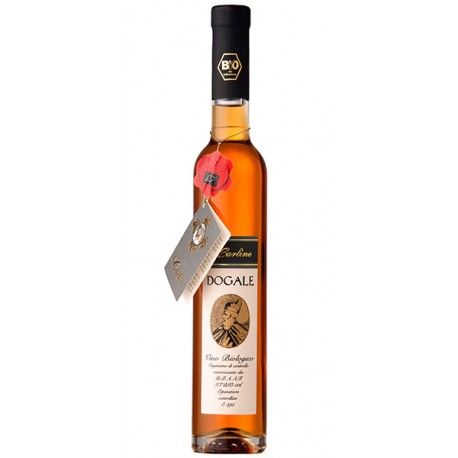 View larger
View larger
Organic Dogale Bianco Dolce Passito IGT Veneto BIO
LCB03
New product
Italian organic wine sweet “Dolce”.
Wine with a lovely amber color, an intense bouquet that is pleasantly sweet on the palate.
Perfect to enjoy it with dry biscuits and cakes based on almonds.
Best serve at 8 to 10°C.
Alcohol content: 13,5% vol.
Data sheet
| Export Box: | 6 bottles |
More info
Italian Sweet Wine BIO
Grapes: Verduzzo Friulano
Area: Lison Pramaggiore - Italy
Fermentation
- Partial drying
- The grapes are cleaned
- Dynamic skin maceration exploiting the fermentation gases
- Controlled fermentation temperature in Barriques
Maturing
Malolactic fermentation and few months' exposure to its fine activated lees and then mellowing in barriques.
Sensorial Feature
Dogale comes from Verduzzo grapes that are harvested late in the season and left to dry until late winter.
The must is then fermented in small oak barrels where the wine mellows for nine long months.
This special technique and constant controls of fermentations phases produces a wine with a lovely amber color, an intense bouquet that is pleasantly sweet on the palate.
Gastronomic Matches
Perfect with dry biscuits and cakes based on almonds.
Serving Temperature: Serve at 8 - 10°C
Bottle: 375 ml in a single box
Analysis
Alcohol content: 13,5% vol.
Total acidity: 4,9 g/l
Volatile acidity: 0,5 g/l
Sugar ripeness: 12 g/l
Organic Agriculture
The methods of Organic Agriculture adopted by our company include the development of a sustainable model, based on the principles of preservation and enhancement of resources and respect for the environment and consumer health.
It indicates a method of cultivation that leads us to program the winemaking from the vineyard, believing in the potential of a vineyard without chemical and respectful of the area of the grape, avoiding to force the soil with chemical fertilizers that tend to stimulate the quantitative production of the plant, to the detriment of the qualitative one and to impoverish the precious relationship Land / Plant / Climate which is the necessary balance for the development of a strong vine that produces healthy grapes, balanced and rich and to make identifiable and unique wines.
Organic wine is a product that comes from a type of cultivation with very specific rules, established by Reg. 834/07 and EC Reg. 889/08.
For the fertilization of soils, for example, we use organic fertilizers or green manure and for the protection of crops we preventively treat them with fungicides and pesticides of natural origin (eg. Copper, sulfur, pyrethrum, etc.).
In addition to an undisputed ethical added value, organic wine also incorporates useful substances for the human body, such as resveratrol, that numerous scientific studies have shown to be a protective agent for the cardiovascular system.
It’s since 1991 that the winegrowers are waiting for the Regulation on BIO wine making and finally on the 8th February 2012, the SCOF (Standing Committee on Organic Farming) has voted his approval by the Reg. 203/12.
Until then there wasn’t a specific European Community legislation that regulate the transformation of the grapes in organic wine. From the 1st of August 2012 it came into force the new regulations that, in addition to standardize the techniques of organic winemaking and the usage of oenological adjuvants, allows to pack wine stating in the label “organic wine” rather than “wine from organic grapes” and the possibility to use the European logo which identifies the biological product in the world.
The Grapes
Organic grapes are grown on vines in soils, managed in harmony with nature, containing large numbers of earthworms, beetles and other organisms. The grape varieties chosen are adapted to local conditions and as resistant to disease as possible. From these organic grapes local wineries and chateaux produce high quality and rich wines.





